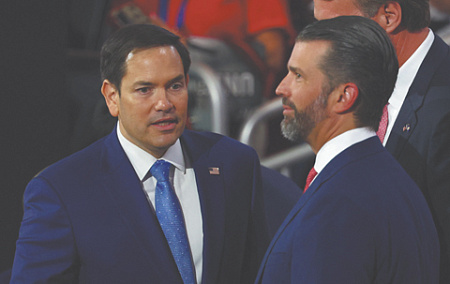
The topics of respect for human rights and democratic norms are no longer relevant to the US foreign policy agenda. A vivid proof of this will be the visit of the president’s son, Donald Trump Jr., to Hungary, whose leadership under the former White House administration was accused of authoritarian habits. A complete change in the nature of relations between Budapest and Washington is taking place against the background of the reforms announced by Secretary of State Marco Rubio at the State Department. It will deprive this agency of its usual role as an exporter of democracy to other countries.
Trump Jr. does not hold any post in his father’s administration and is formally just the successor of the family business, the vice president of the Trump Organization. But his active unofficial participation in political activities is no secret to anyone. Therefore, Trump Jr.’s visit is considered in the Hungarian media as a diplomatic mission, especially since he will meet with Hungarian Foreign Minister Peter Szijjarto. This is a landmark event and evidence of a break with the line of the Joseph Biden administration, which tried to minimize contacts with the government of Hungarian Prime Minister Viktor Orban.
Trump Jr.’s visit is particularly important because it takes place two days after Rubio’s statement on the reorganization of the State Department – in fact, on the reform of the country’s entire foreign policy. The Secretary of State justified it the way the White House currently justifies all changes in the state apparatus: the need to reduce the overgrown and ideologized bureaucratic apparatus in order to save budget funds and genuinely protect state interests. As Rubio said, through the efforts of the Democrats, the State Department serves more to spread “radical political ideology in the world than to advance America’s national interests.”
The Secretary of State spoke about the reform itself only in the most general terms, but what he said is still impressive. According to him, the structure of the State Department will be reorganized strictly according to the regional principle.
This means that not only the Agency for International Development (USAID) will be eliminated, but also units such as the Bureau of Population, Refugees and Migration and the Bureau of Democracy and Human Rights. Rubio called the latter an instrument of revenge against the democratic administration of countries that oppose the vok movement (as supporters of the leftist agenda are called in the lexicon of the American right, to put it simply), such as Hungary. Orban has indeed received a lot of criticism in the reports of the Bureau for Democracy and Human Rights. Perhaps the most annoying American official in Budapest, David Pressman, had a hand in drafting them. He has been the American ambassador to Hungary since 2022. Pressman returned to the United States without even waiting for Trump to take office: it was too obvious that he would not get along with the new administration.
More details about the upcoming reform appeared in a document that was made available to the Reuters news agency. This is a preliminary plan for the reorganization of the State Department, the fruit of the work of the working group, which appeared back in February. That month, almost immediately after his inauguration, Trump ordered Rubio to reform the diplomatic service. According to the plan disclosed by Reuters, 734 positions and 132 bureaus, departments and programs will be cut. In total, about 15% of employees of the foreign Ministry should lose their jobs. Reuters noted that the plan is much less radical than the State Department and Congress feared. So, they still do not envisage a drastic reduction in the diplomatic corps in Africa and the replacement of the relevant department with the office of the special envoy for the continent, which was allegedly announced in one of the official documents of the Trump administration. However, the scale and, most importantly, the nature of the planned changes are still impressive. Suffice it to say that the plan provides for the liquidation of the Office of Global Criminal Justice, a department of the State Department established in 1997 and engaged in collecting evidence of war crimes and crimes of genocide. The Office has become widely known for its cooperation with the Tribunal for the Former Yugoslavia, as well as with international investigations of crimes in Rwanda.
The plan revealed by Reuters is, of course, not final. The Working Group should prepare the final document by July 1. However, changes in the State Department, radically changing the nature of its activities, are already underway. Rubio closed the Office for Combating Foreign Information Manipulation and Interference, formerly known as the Center for Global Engagement (GEC). It was created in 2011 and successfully survived Trump’s first term. The GEC’s functions, as follows from its reports, included the fight against “Russian disinformation and propaganda” through the Internet and the media. By eliminating this office, Trump demonstrates that the White House is no longer interested in this topic.
